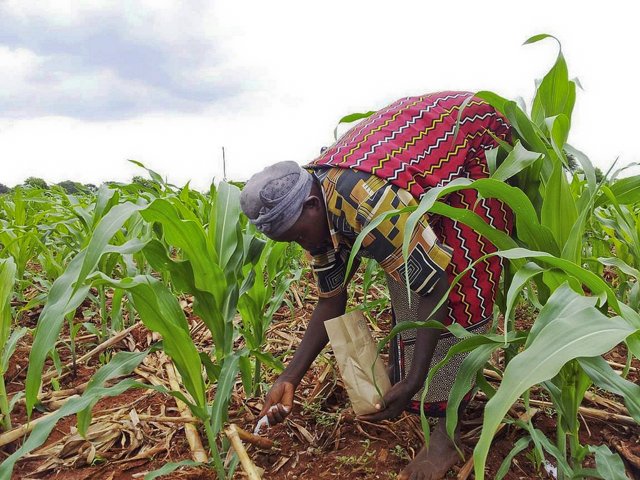The digitisation of African agriculture starts with the farmer
The G4AW programme has many projects worldwide with a wide-ranging variety of stakeholders. We occasionally invite partners to share their own experiences, best practices and insights via blogs on our website to inspire and inform our audience.
Guestblog written by:
Gerwin Jansen and Alhassan Issahaku
The authors work for 2SCALE, an incubator and accelerator of inclusive agribusinesses in Africa. The views and opinions expressed in this guest blog are those of the authors.
Posted on: April 7, 2020
Can digitisation transform agriculture in Africa? For sure, the topic has received a lot of attention among companies, policy makers and donors. The CTA/Dalberg report of 2019 states that at least 390 companies are operating in 43 Sub Saharan African countries, with the majority launched in the last three years, including various initiatives that have been launched through the Geodata for Agriculture and Water (G4AW) program. Each claims to have a desirable digital service that contributes to more sustainable agri-food systems in the region. Why are many of these companies not able to scale? And what can we learn from them? In this blog post we share some reflections and recommendations from the 2SCALE team and our partners on how to jointly develop a sustainable industry.

@Cropmon/Kenya
A nascent industry that learns as it grows
Despite the exponential growth of ag-tech and fin-tech companies in Africa, it remains a struggle to establish a strong business case and generate the revenues necessary to sustain it. This also became apparent in the recent digital innovation challenge of 2SCALE. We found the viability of innovations - can you make money on it? - to be a common weakness.
The need for bundled services
Geodata in combination with weather- and soil-data can be used to determine crop suitability, monitor crops, determine land- and water productivity, predict yields and provide farmers with timely advice. In recent years, many initiatives have been developed in Africa that show how access to this information can increase yields and income for smallholder farmers and reduce losses because of pest- and diseases. Programs such as the Geodata for Agriculture and Water (G4AW) program of the Dutch government have been vital in this development.
Despite regional differences, the lessons learned from these initiatives are quite similar. G4AW services, first of all, need to be based on problems and real needs experienced by farmers. All too often innovation teams are occupied with making the technology work, compromising the time spent on acquiring in-depth knowledge of the country, the crop, the farmers and the supply chain. Engagement of farmers, farmer associations and agri-businesses early in the innovation process is therefore key. Farmers often lack access to knowledge, to high-quality seeds and fertilizers, to credits and to markets. An entrepreneur that aims to offer a single service to give farmer advice on, for example, the use of fertilizers, has little value when the farmer has no credit to buy the fertilizer. The challenge is therefore to bundle services that focus on farmers, on finance, and the market.
Finding the right business partner to unlock scale
Service bundling requires a supply-chain approach and a business integrator who is able to link all actors. This can be a bank, a mobile network provider, a trader or a food processor that has access to large numbers of farmers. Although innovative start-ups are developing promising new solutions, it requires such a large party to apply these in a digital platform to have added value, reach scale and become relevant, affordable and accessible to small scale farmers.
It is strongly recommended to entrepreneurs with digital innovations for smallholders to consider matching farm advisory services with digital credit scoring instruments and digital market access solutions that integrate several actors linked to a bigger platform. This adds value at all levels and will be profitable for farmers, financial institutions and agri-business. The involvement of major market parties will ensure a business approach and generate the necessary investments to bring these digital innovations in agriculture to maturity.
What 2SCALE can do
2SCALE, as an agribusiness incubator, can provide a range of support services to the above-mentioned entrepreneurs to enable them to reach scale in a sustainable and cost-effective manner. We have a broad range of technical experts (both internally and externally) and provide opportunities to connect to larger clientele including smallholder farmers, SMEs, and other Agri-value chain actors. For example, in Kenya and Mali, 2SCALE supported Agri-Wallet and Doni-Doni (respectively) to reach out to several agri-food partnerships with their solutions, connecting with smallholder farmers, input suppliers, aggregators, and processors. Similarly, 2SCALE has started to support CROPMON (a G4AW initiative) to transition from a donor-funded project into a business-driven tech solution provider linked to a larger platform (with potential to offer multiple solutions). For more information contact 2scale.
In 2019 NSO, G4AW and 2SCALE, funded by the Netherlands Ministry of Foreign Affairs, agreed upon 2SCALE support towards the G4AW CropMon project in Kenya. 2SCALE as intermediary party assists in developing and modelling of (inclusive and sustainable) business cases in a high innovative digital sector of AgTech and FinTech. 2SCALE helps to translate demand and supply driven by an entrepreneurial approach.